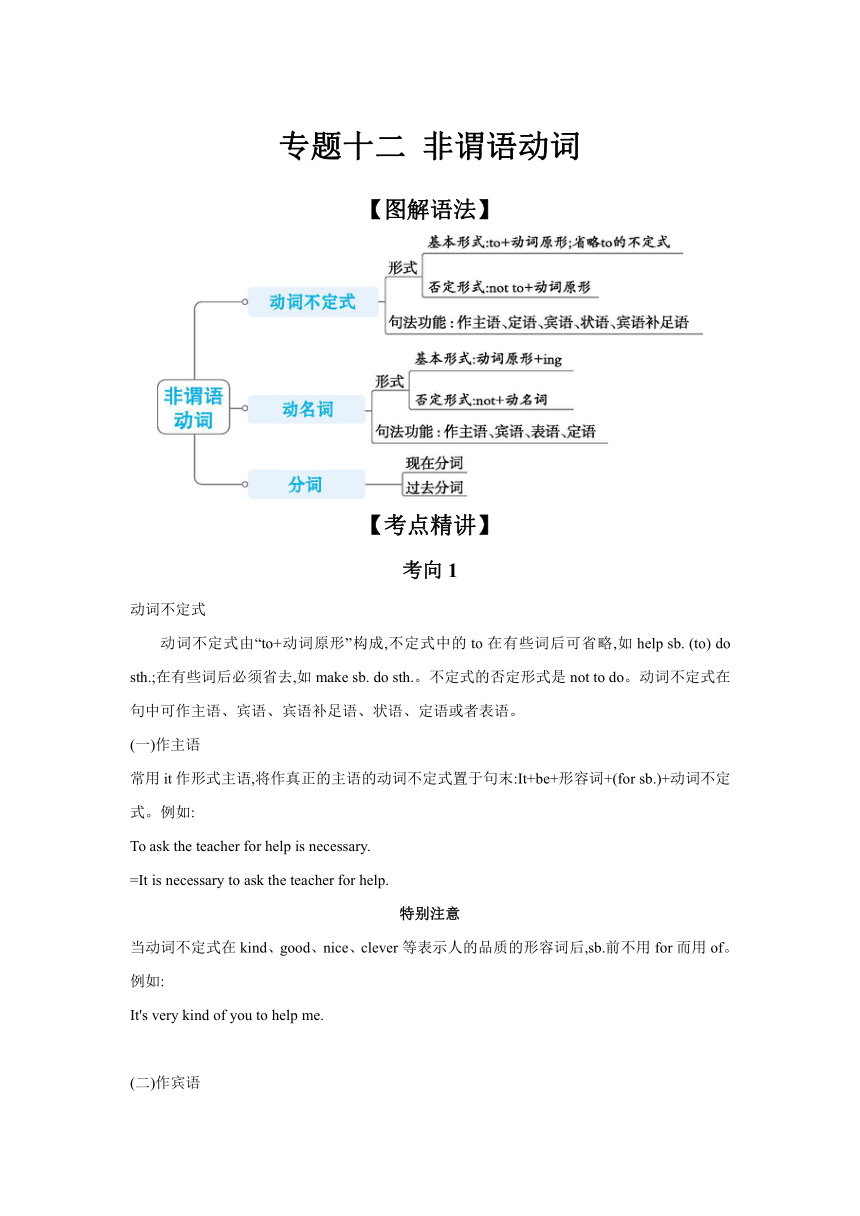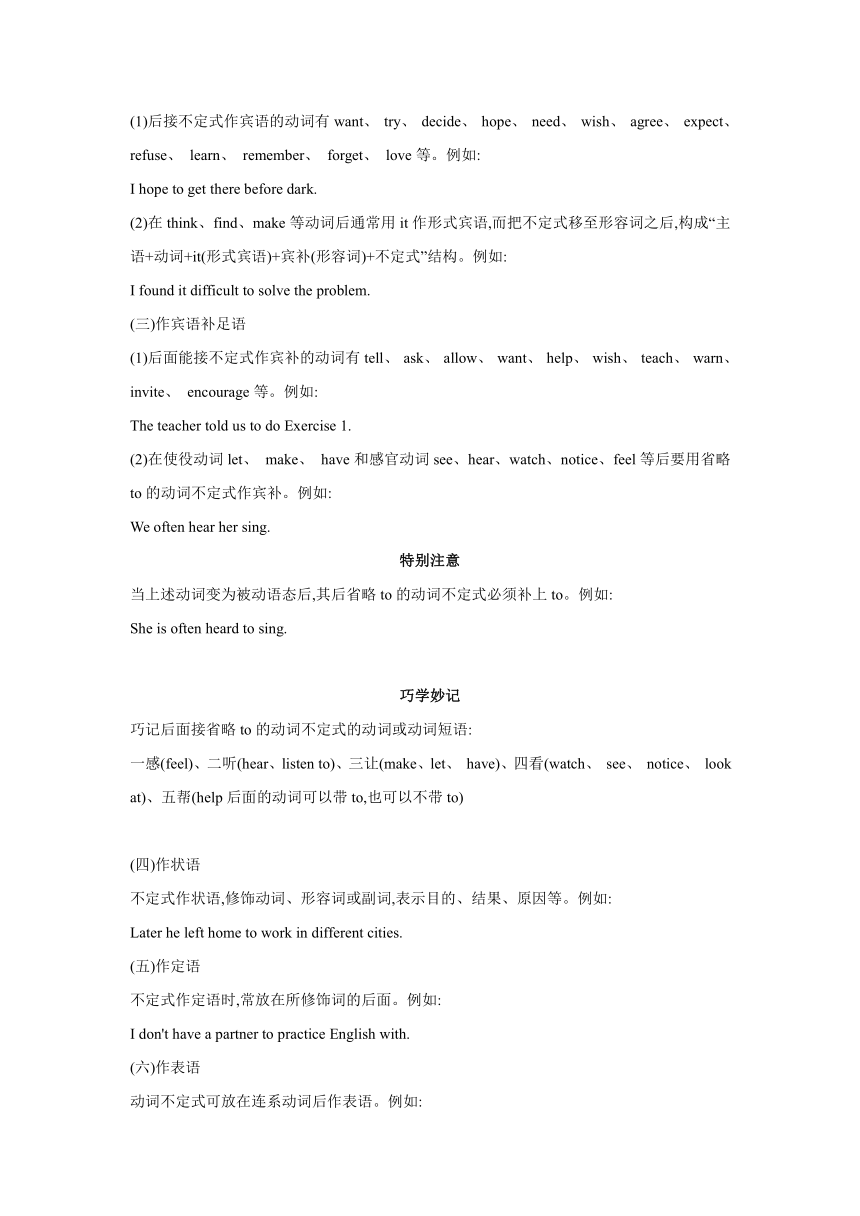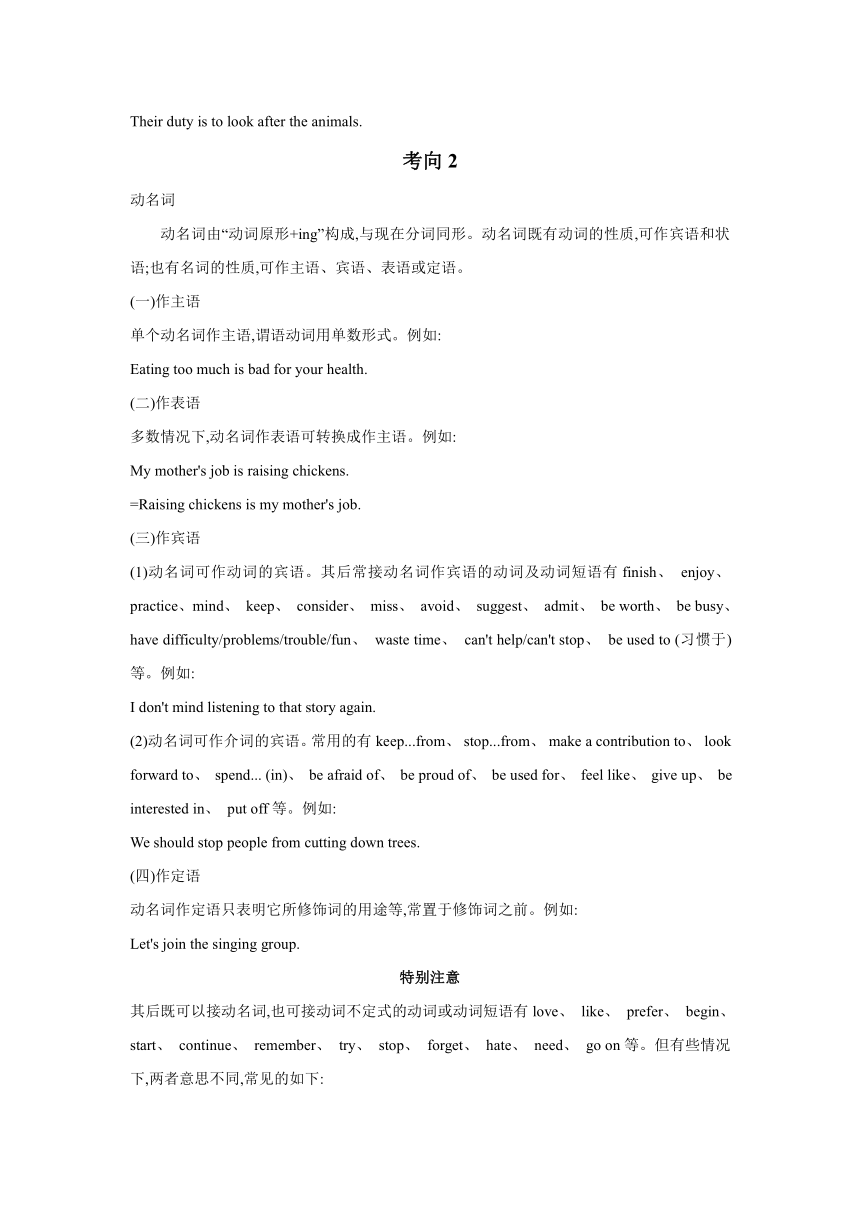【特色专题专训】专题十二 非谓语动词 2025年中考人教版英语总复习 (广东专版)(含解析)
文档属性
| 名称 | 【特色专题专训】专题十二 非谓语动词 2025年中考人教版英语总复习 (广东专版)(含解析) |  | |
| 格式 | docx | ||
| 文件大小 | 77.5KB | ||
| 资源类型 | 教案 | ||
| 版本资源 | 人教新目标(Go for it)版 | ||
| 科目 | 英语 | ||
| 更新时间 | 2024-11-14 10:57:55 | ||
图片预览



文档简介
专题十二 非谓语动词
【图解语法】
【考点精讲】
考向1
动词不定式
动词不定式由“to+动词原形”构成,不定式中的to在有些词后可省略,如help sb. (to) do sth.;在有些词后必须省去,如make sb. do sth.。不定式的否定形式是not to do。动词不定式在句中可作主语、宾语、宾语补足语、状语、定语或者表语。
(一)作主语
常用it作形式主语,将作真正的主语的动词不定式置于句末:It+be+形容词+(for sb.)+动词不定式。例如:
To ask the teacher for help is necessary.
=It is necessary to ask the teacher for help.
特别注意
当动词不定式在kind、good、nice、clever等表示人的品质的形容词后,sb.前不用for而用of。例如:
It's very kind of you to help me.
(二)作宾语
(1)后接不定式作宾语的动词有want、 try、 decide、 hope、 need、 wish、 agree、 expect、 refuse、 learn、 remember、 forget、 love等。例如:
I hope to get there before dark.
(2)在think、find、make等动词后通常用it作形式宾语,而把不定式移至形容词之后,构成“主语+动词+it(形式宾语)+宾补(形容词)+不定式”结构。例如:
I found it difficult to solve the problem.
(三)作宾语补足语
(1)后面能接不定式作宾补的动词有tell、 ask、 allow、 want、 help、 wish、 teach、 warn、 invite、 encourage等。例如:
The teacher told us to do Exercise 1.
(2)在使役动词let、 make、 have和感官动词see、hear、watch、notice、feel等后要用省略to的动词不定式作宾补。例如:
We often hear her sing.
特别注意
当上述动词变为被动语态后,其后省略to的动词不定式必须补上to。例如:
She is often heard to sing.
巧学妙记
巧记后面接省略to的动词不定式的动词或动词短语:
一感(feel)、二听(hear、listen to)、三让(make、let、 have)、四看(watch、 see、 notice、 look at)、五帮(help后面的动词可以带to,也可以不带to)
(四)作状语
不定式作状语,修饰动词、形容词或副词,表示目的、结果、原因等。例如:
Later he left home to work in different cities.
(五)作定语
不定式作定语时,常放在所修饰词的后面。例如:
I don't have a partner to practice English with.
(六)作表语
动词不定式可放在连系动词后作表语。例如:
Their duty is to look after the animals.
考向2
动名词
动名词由“动词原形+ing”构成,与现在分词同形。动名词既有动词的性质,可作宾语和状语;也有名词的性质,可作主语、宾语、表语或定语。
(一)作主语
单个动名词作主语,谓语动词用单数形式。例如:
Eating too much is bad for your health.
(二)作表语
多数情况下,动名词作表语可转换成作主语。例如:
My mother's job is raising chickens.
=Raising chickens is my mother's job.
(三)作宾语
(1)动名词可作动词的宾语。其后常接动名词作宾语的动词及动词短语有finish、 enjoy、 practice、mind、 keep、 consider、 miss、 avoid、 suggest、 admit、 be worth、 be busy、 have difficulty/problems/trouble/fun、 waste time、 can't help/can't stop、 be used to (习惯于)等。例如:
I don't mind listening to that story again.
(2)动名词可作介词的宾语。常用的有keep...from、 stop...from、 make a contribution to、 look forward to、 spend... (in)、 be afraid of、 be proud of、 be used for、 feel like、 give up、 be interested in、 put off等。例如:
We should stop people from cutting down trees.
(四)作定语
动名词作定语只表明它所修饰词的用途等,常置于修饰词之前。例如:
Let's join the singing group.
特别注意
其后既可以接动名词,也可接动词不定式的动词或动词短语有love、 like、 prefer、 begin、 start、 continue、 remember、 try、 stop、 forget、 hate、 need、 go on等。但有些情况下,两者意思不同,常见的如下:
【随堂练习】
用括号内所给词的适当形式填空
1.—Be sure not (miss) the concert.
—OK.I won't.
2.—John, you'll find it very easy (achieve) your goal if you put your heart into it.
—OK.I'll try my best.
3.It seems that it's going to rain.You'd better (keep) the windows open when you leave the house.
4.—What should I do, doctor
— (keep) healthy, you should take more exercise.
5.That day I saw some parents sitting at the back of the classroom, (listen) to the teacher.
6.Linda used to get up late, but now she is used to (get up) early.
7.—Is Jim in the gym by himself
—No. There's another boy (play) table tennis with him.
8. (eat) too many hamburgers is bad for your health.
9.In the old days he had no money (go) to school.
10.The box is too heavy for the little child (carry).
11.Memorizing many English words can help you (improve) your English.
12.This story makes me (think) of what happened three years ago.
13.The little boy is old enough (go) to school alone.
14.I'm looking forward to (meet) my friend, Darren.
15.The young man was often heard (sing) in the park.
16.I wanted (borrow) some books on how to protect the environment.
17.The doctors did what they could (save) that child.
18.Before December, we will finish (build) the park.
19.—Bob speaks Chinese quite well.
—Yes, so he does.He practices (speak) Chinese every day.
20.—I feel tired and sleepy.
—Why not stop (relax)
【参考答案】
1. to miss 2.to achieve 3.not keep 4. To keep
5.listening 6.getting up 7.playing 8.Eating 9.to go
10.to carry 11.(to) improve 12. think 13.to go 14.meeting 15.to sing 16.to borrow 17. to save 18.building 19.speaking 20.to relax
【仿真训练】
语法选择
A(原创)
There was once a famous scientist who made several important discoveries. Once he was asked how he was able 1 so creative. He replied that it all came from an experience he had with his mother when he was 2 years old. He was trying 2 a bottle of milk out of the fridge. But the bottle was too slippery (滑的) and he dropped it. The kitchen floor was covered with milk.
When his mother came into the kitchen, instead of 3 at him or punishing him, she said, “Robert, what a great and wonderful mess you have made! I have never seen such a huge puddle of (一滩) milk. Would you like 4 in the milk for a few minutes before 5 it up ”
So he did. After a few minutes, they cleaned it up together. Then his mother said, “This was a failed experiment (实验) on how 6 a big bottle of milk with two tiny hands. Let's go to the backyard and fill the bottle with water and see if you can find a way 7 it without dropping it.”
The little boy learned that if he held the bottle at the top near the lip with both hands, he could carry it without 8 it. What a wonderful lesson!
The scientist then added that it was at that moment that he knew he didn't need to be afraid 9 mistakes. He learned that mistakes are just opportunities 10 something new—which is, after all, what scientific experiments are all about. Even if the experiment doesn't “work”, we can still learn something valuable from it.
( )1.A.to be B.being C.been
( )2.A.to take B.take C.taken
( )3.A.shouts B.shouted C.shouting
( )4.A.to play B.played C.playing
( )5.A.clean B.cleaning C.to clean
( )6.A.carrying B.carries C.to carry
( )7.A.carrying B.carries C.to carry
( )8.A.drop B.dropping C.to drop
( )9.A.makes B.to make C.making
( )10.A.to learn B.learning C.learned
B(改编)
You can read up your favorite skateboard star, email or test your friends. You can do a lot of wonderful things online. That's why the Internet is amazing! If you're a kid who likes 1 fun and chat with friends online, here're the things you need 2 carefully in order to stay safe and avoid problems.
Not all websites are safe for students. Luckily, your parents can guide you to some websites. And you can also visit the websites your teachers suggest. Stick to these safe websites and don't go out 3 anything new. Some websites don't allow kids under a certain age 4 them. You may find it fun 5 about your age. It's safer to tell the truth and avoid 6 in those websites until you're older.
The loss of Internet ID can cause big problems. So it is important 7 your Internet ID safe. If someone can get on the Internet in your username, you have no control over what they do or say. And everyone will think it's you! So don't let anyone know your username for the Internet. And don't share your passwords with anyone except your parents.
8 good care of your private information is necessary. Never tell an online stranger where you live. Your address can make it much easier for bad people 9 you. Your phone number is another important piece of personal information. Once it's out online, it can bring you a lot of trouble. Many online frauds(欺诈) are carried out with the help of 10 people's phone numbers. Your parents' names are also private information. It is risky if they are leaked out online.
( )1.A.had B.to have C.have
( )2.A.to watch B.watch C.watching
( )3.A.tried B.to try C.trying
( )4.A.to visit B.visited C.visiting
( )5.A.lied B.to lie C.lying
( )6.A.clicked B.to click C.clicking
( )7.A.to make B.made C.making
( )8.A.Take B.To taking C.Taking
( )9.A.find B.to find C.finding
( )10.A.have B.to have C.having
【参考答案】
A
1~5 AACAB 6~10 CCBBA
B
1~5 BABAB 6~10 CACBC
【图解语法】
【考点精讲】
考向1
动词不定式
动词不定式由“to+动词原形”构成,不定式中的to在有些词后可省略,如help sb. (to) do sth.;在有些词后必须省去,如make sb. do sth.。不定式的否定形式是not to do。动词不定式在句中可作主语、宾语、宾语补足语、状语、定语或者表语。
(一)作主语
常用it作形式主语,将作真正的主语的动词不定式置于句末:It+be+形容词+(for sb.)+动词不定式。例如:
To ask the teacher for help is necessary.
=It is necessary to ask the teacher for help.
特别注意
当动词不定式在kind、good、nice、clever等表示人的品质的形容词后,sb.前不用for而用of。例如:
It's very kind of you to help me.
(二)作宾语
(1)后接不定式作宾语的动词有want、 try、 decide、 hope、 need、 wish、 agree、 expect、 refuse、 learn、 remember、 forget、 love等。例如:
I hope to get there before dark.
(2)在think、find、make等动词后通常用it作形式宾语,而把不定式移至形容词之后,构成“主语+动词+it(形式宾语)+宾补(形容词)+不定式”结构。例如:
I found it difficult to solve the problem.
(三)作宾语补足语
(1)后面能接不定式作宾补的动词有tell、 ask、 allow、 want、 help、 wish、 teach、 warn、 invite、 encourage等。例如:
The teacher told us to do Exercise 1.
(2)在使役动词let、 make、 have和感官动词see、hear、watch、notice、feel等后要用省略to的动词不定式作宾补。例如:
We often hear her sing.
特别注意
当上述动词变为被动语态后,其后省略to的动词不定式必须补上to。例如:
She is often heard to sing.
巧学妙记
巧记后面接省略to的动词不定式的动词或动词短语:
一感(feel)、二听(hear、listen to)、三让(make、let、 have)、四看(watch、 see、 notice、 look at)、五帮(help后面的动词可以带to,也可以不带to)
(四)作状语
不定式作状语,修饰动词、形容词或副词,表示目的、结果、原因等。例如:
Later he left home to work in different cities.
(五)作定语
不定式作定语时,常放在所修饰词的后面。例如:
I don't have a partner to practice English with.
(六)作表语
动词不定式可放在连系动词后作表语。例如:
Their duty is to look after the animals.
考向2
动名词
动名词由“动词原形+ing”构成,与现在分词同形。动名词既有动词的性质,可作宾语和状语;也有名词的性质,可作主语、宾语、表语或定语。
(一)作主语
单个动名词作主语,谓语动词用单数形式。例如:
Eating too much is bad for your health.
(二)作表语
多数情况下,动名词作表语可转换成作主语。例如:
My mother's job is raising chickens.
=Raising chickens is my mother's job.
(三)作宾语
(1)动名词可作动词的宾语。其后常接动名词作宾语的动词及动词短语有finish、 enjoy、 practice、mind、 keep、 consider、 miss、 avoid、 suggest、 admit、 be worth、 be busy、 have difficulty/problems/trouble/fun、 waste time、 can't help/can't stop、 be used to (习惯于)等。例如:
I don't mind listening to that story again.
(2)动名词可作介词的宾语。常用的有keep...from、 stop...from、 make a contribution to、 look forward to、 spend... (in)、 be afraid of、 be proud of、 be used for、 feel like、 give up、 be interested in、 put off等。例如:
We should stop people from cutting down trees.
(四)作定语
动名词作定语只表明它所修饰词的用途等,常置于修饰词之前。例如:
Let's join the singing group.
特别注意
其后既可以接动名词,也可接动词不定式的动词或动词短语有love、 like、 prefer、 begin、 start、 continue、 remember、 try、 stop、 forget、 hate、 need、 go on等。但有些情况下,两者意思不同,常见的如下:
【随堂练习】
用括号内所给词的适当形式填空
1.—Be sure not (miss) the concert.
—OK.I won't.
2.—John, you'll find it very easy (achieve) your goal if you put your heart into it.
—OK.I'll try my best.
3.It seems that it's going to rain.You'd better (keep) the windows open when you leave the house.
4.—What should I do, doctor
— (keep) healthy, you should take more exercise.
5.That day I saw some parents sitting at the back of the classroom, (listen) to the teacher.
6.Linda used to get up late, but now she is used to (get up) early.
7.—Is Jim in the gym by himself
—No. There's another boy (play) table tennis with him.
8. (eat) too many hamburgers is bad for your health.
9.In the old days he had no money (go) to school.
10.The box is too heavy for the little child (carry).
11.Memorizing many English words can help you (improve) your English.
12.This story makes me (think) of what happened three years ago.
13.The little boy is old enough (go) to school alone.
14.I'm looking forward to (meet) my friend, Darren.
15.The young man was often heard (sing) in the park.
16.I wanted (borrow) some books on how to protect the environment.
17.The doctors did what they could (save) that child.
18.Before December, we will finish (build) the park.
19.—Bob speaks Chinese quite well.
—Yes, so he does.He practices (speak) Chinese every day.
20.—I feel tired and sleepy.
—Why not stop (relax)
【参考答案】
1. to miss 2.to achieve 3.not keep 4. To keep
5.listening 6.getting up 7.playing 8.Eating 9.to go
10.to carry 11.(to) improve 12. think 13.to go 14.meeting 15.to sing 16.to borrow 17. to save 18.building 19.speaking 20.to relax
【仿真训练】
语法选择
A(原创)
There was once a famous scientist who made several important discoveries. Once he was asked how he was able 1 so creative. He replied that it all came from an experience he had with his mother when he was 2 years old. He was trying 2 a bottle of milk out of the fridge. But the bottle was too slippery (滑的) and he dropped it. The kitchen floor was covered with milk.
When his mother came into the kitchen, instead of 3 at him or punishing him, she said, “Robert, what a great and wonderful mess you have made! I have never seen such a huge puddle of (一滩) milk. Would you like 4 in the milk for a few minutes before 5 it up ”
So he did. After a few minutes, they cleaned it up together. Then his mother said, “This was a failed experiment (实验) on how 6 a big bottle of milk with two tiny hands. Let's go to the backyard and fill the bottle with water and see if you can find a way 7 it without dropping it.”
The little boy learned that if he held the bottle at the top near the lip with both hands, he could carry it without 8 it. What a wonderful lesson!
The scientist then added that it was at that moment that he knew he didn't need to be afraid 9 mistakes. He learned that mistakes are just opportunities 10 something new—which is, after all, what scientific experiments are all about. Even if the experiment doesn't “work”, we can still learn something valuable from it.
( )1.A.to be B.being C.been
( )2.A.to take B.take C.taken
( )3.A.shouts B.shouted C.shouting
( )4.A.to play B.played C.playing
( )5.A.clean B.cleaning C.to clean
( )6.A.carrying B.carries C.to carry
( )7.A.carrying B.carries C.to carry
( )8.A.drop B.dropping C.to drop
( )9.A.makes B.to make C.making
( )10.A.to learn B.learning C.learned
B(改编)
You can read up your favorite skateboard star, email or test your friends. You can do a lot of wonderful things online. That's why the Internet is amazing! If you're a kid who likes 1 fun and chat with friends online, here're the things you need 2 carefully in order to stay safe and avoid problems.
Not all websites are safe for students. Luckily, your parents can guide you to some websites. And you can also visit the websites your teachers suggest. Stick to these safe websites and don't go out 3 anything new. Some websites don't allow kids under a certain age 4 them. You may find it fun 5 about your age. It's safer to tell the truth and avoid 6 in those websites until you're older.
The loss of Internet ID can cause big problems. So it is important 7 your Internet ID safe. If someone can get on the Internet in your username, you have no control over what they do or say. And everyone will think it's you! So don't let anyone know your username for the Internet. And don't share your passwords with anyone except your parents.
8 good care of your private information is necessary. Never tell an online stranger where you live. Your address can make it much easier for bad people 9 you. Your phone number is another important piece of personal information. Once it's out online, it can bring you a lot of trouble. Many online frauds(欺诈) are carried out with the help of 10 people's phone numbers. Your parents' names are also private information. It is risky if they are leaked out online.
( )1.A.had B.to have C.have
( )2.A.to watch B.watch C.watching
( )3.A.tried B.to try C.trying
( )4.A.to visit B.visited C.visiting
( )5.A.lied B.to lie C.lying
( )6.A.clicked B.to click C.clicking
( )7.A.to make B.made C.making
( )8.A.Take B.To taking C.Taking
( )9.A.find B.to find C.finding
( )10.A.have B.to have C.having
【参考答案】
A
1~5 AACAB 6~10 CCBBA
B
1~5 BABAB 6~10 CACBC
同课章节目录
- 词法
- 名词
- 动词和动词短语
- 动词语态
- 动词时态
- 助动词和情态动词
- 非谓语动词
- 冠词
- 代词
- 数词和量词
- 形容词副词及其比较等级
- 介词和介词短语
- 连词和感叹词
- 构词法
- 相似、相近词比较
- 句法
- 陈述句
- 一般疑问句和否定疑问句
- 特殊疑问句及选择疑问句
- 反意疑问句
- 存在句(There be句型)
- 宾语从句
- 定语从句
- 状语从句
- 主谓一致问题
- 简单句
- 并列句
- 复合句
- 主谓一致
- 主、表语从句
- 名词性从句
- 直接引语和间接引语
- 虚拟语气
- 感叹句
- 强调句
- 倒装句
- 祈使句
- 句子的成分
- 句子的分类
- 题型专区
- 单项选择部分
- 易错题
- 完形填空
- 阅读理解
- 词汇练习
- 听说训练
- 句型转换
- 补全对话
- 短文改错
- 翻译
- 书面表达
- 任务型阅读
- 语法填空
- 其他资料
